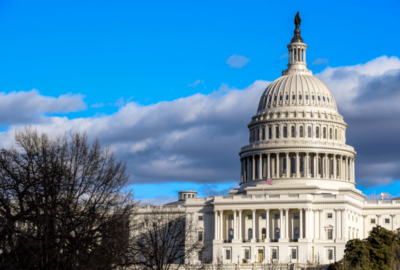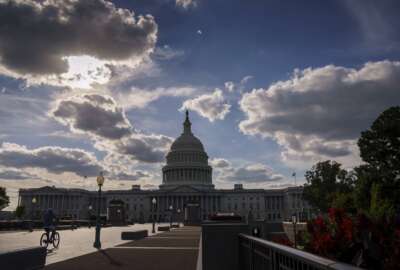Irresistible forces are pushing on a seemingly immovable Congress
What a mess. Border security, foreign military aid, and the lack of a 2024 budget agreement have turned into a sort of Gordian Knot for Congress. Happy New Year...
What a mess. Border security, foreign military aid, and the lack of a 2024 budget agreement have turned into a sort of Gordian Knot for Congress. Happy New Year indeed. For what could happen this week, the Federal Drive with Tom Temin spoke with Bloomberg Government Deputy News Director Loren Duggan.
Interview Transcript:
Tom Temin And is there a way out of this? I mean, you just hear all these conflicting reports, but even members themselves say we’re not going to be able to get a budget done.
Loren Duggan That’s right. I mean, they’re gone this week and the week after that for the holiday season. Speaker Mike Johnson had made clear he wanted to send his membership home and did on the 14th. We saw the Senate in for a few days last week but didn’t really make progress on the big issues, both fiscal 2024 spending and then this border security and international aid package. That really was the reason they had stuck around was to try to make progress on that. So we go into the new year without much clarity on what’s going to happen on those issues, plus everything else that Congress needs to get done just in the routine order of business and other short term deadlines have set for themselves. So you’re right, it’s going to be a messy start to 20, 24 up on Capitol Hill.
Tom Temin Could this be one of those situations where there’s a sudden breakthrough in the impasse with respect to the border and what the border policies shall be? Because, you know, Chuck Schumer says, yeah, we’re all for a better border, but within our values, whatever that means. And the Republicans say we’ve got to shut this thing down so that there’s not this influx and maybe there is a middle ground that, I mean, sometimes these things break just when they seem like they never will.
Loren Duggan I think that’s true. I think there’s two things. One is a list of principles that everybody could agree to Republicans and Democrats and independents on the Hill working with the administration. And then what does the actual legislation look like? Because that was one of the sticking points last week was given the timing of where they were talking and what they were talking about. There was concern about seeing the actual text, what the legislation does, because they want to get it right. I think Chris Murphy had said they haven’t really touched border legislation in 40 years because it is so tough to do. So I think that’s one of the things that could make it difficult if they got to agreement that a broad swath of the House and the Senate could both agree to. You can see a path forward. But getting to that point is going to be hard on this border and aid package, let alone the other spending talks that are also going on with seemingly not much progress.
Tom Temin Because sometimes they seem to be talking at cross-purposes. You know, the Republicans that are pushing for the border security, they see that as a national security issue. And therefore, the question is, well, if we’re concerned with the national security of countries abroad, what about our own national security? And Democrats see it in a different colored light, you might say, as a border and immigration issue, but not a national security issue. I’m just guessing. But when they talk at cross-purposes like that, that’s what makes things difficult.
Loren Duggan And the linkage is also here because when President Biden requested money for Ukraine and Israel, there was also a request for money for the border to help with the different agencies that are dealing with the influx there. And in some ways, that opened up for discussion about with money comes consequences or responsibilities or oversight or even changes to policy. That’s for the people who reach our border or trying to reach our border. So there was that natural linkage to start it up. But the consensus is what’s been hard here. Republicans in the House passed a bill this year, H.R. 2, that they continued to try to push as their starting position. Democrats in the Senate don’t want to go to that extent, but as we saw with President Biden and the homeland security secretary offering some title 42-esque provisions, that’s what they had used during the pandemic to keep people from crossing, you know, some sort of version of that could be in the mix still. So, you know, you’ve seen some movement, you’ve seen some sitting around the table before the holidays, and everyone says they’ll get back to it as soon as they can. So we’ll see if they can, you know, come to a consensus there. But it is going to be difficult.
Tom Temin And just as an aside, here’s what Virginia Senator Mark Warner said to WTOP. Capitol Hill correspondent Mitchell Miller.
Sen. Mark Warner Of course, I’m worried if we get this through, it will clearly have to be broadly bipartisan. We’ve got to get it done. We’re basically going to be dramatically changing not only border policy, but in many ways immigration laws.
Tom Temin And on the tie in with foreign military aid.
Sen. Mark Warner We can’t say that Ukraine’s a crisis. Israel’s a crisis. The border is a crisis and then not do our job.
Tom Temin Virginia Senator Mark Warner speaking to WTOP’s Capitol Hill correspondent Mitchell Miller. We were speaking with Loren Dugan, deputy news director at Bloomberg Government. And then there is the national budget for the government. And literally the day the House gets back is only a couple of weeks until the shutdown deadline. And again, they’re talking at cross-purposes because, you know, one side doesn’t want to do any more CRs, and the other side doesn’t like what the alternative that is. And so the third way is a cessation of appropriations.
Loren Duggan That’s right. And we have two deadlines coming up, January 19th, February 2nd. January 19th, to your point, is only two weeks after they get back from the holidays and there’s not agreement yet on what to. Do overall on spending, which makes it very hard to figure out what to do for each of the bills that are covered by those two deadlines. One of the things that seemed to be a challenge right before the holidays was they didn’t even agree exactly what they had agreed on when they signed this debt limit deal. They know what the law says. They know what the spending caps in that measure were. But there’s this notion of a side deal that President Biden and then Speaker McCarthy worked out for spending above that cap that you would offset with rescissions and other accounting mechanisms. And that’s really a sticking point now, is figuring out what did they exactly agree to and how could they move forward with that. It’s really hard to write a bill unless you know what your target is. And until they resolved that and they headed into the holidays seemingly without a resolution, it’s going to be difficult. So we could be facing a shutdown for some things on January 19th, others on February 2nd. So it could be, again, a very weird late January with kind of this partial and then maybe complete shutdown if they can’t figure out something to do. Your point about no more short term seizures feels like a real one. The last two were hard to get over the line and cost one speaker his job. So there’s a lot at play there.
Tom Temin And meanwhile, when you get into February, well, the next thing you know, the cherry blossoms are not far behind. And then there’s April deadlines for several matters that they’ve got to deal with.
Loren Duggan Right. Two big ones coming up. One is March 8th. That’s the FAA authorization. So that agency receives funding. But it’s authorization is important because the ticket taxes it collects in are used to fund operations. Those would all lapse on March 8th without some sort of action. And then on April 19th, that’s the new deadline for the Foreign Intelligence Surveillance Act, these important overseas surveillance powers that people want to curtail as part of any long term extension. So those are two deadlines that are not too long after the really big ones in January and February. All of those things have deadlines and there will be some sort of vehicle to attempt to resolve that. And lawmakers are also going to look to use those to advance other things. One big thing is an unresolved tax package revived some important business tax breaks like R&D. There’s interest in getting that done as soon as possible. If they can stick it into one of these packages and get that over the line. They’ll be looking to do that as well.
Tom Temin Is there any controversy over FAA authorization?
Loren Duggan The House passed a bill on a really bipartisan basis, but in the Senate, there’s been a holdup over pilot training requirements and some other language in that. So if the Senate can come to an agreement on what it wants to do with its bill, then maybe the House and the Senate can come together. They just haven’t been able to get that done yet. But that’s one that may have an easier path if they can work through some issues.
Tom Temin And on the nominations front, those military hold ups from Senator Tuberville, that’s completely over now at this point.
Loren Duggan That’s right. They made a last minute deal last week to get the last 11 generals and admirals over the line. And then they also made an arrangement to deal with other nominations, because there’s a rule if you don’t do something by the end of the year, you often send it back to the White House. They kept some of them in stasis, so they’re still there in front of the Senate and they’ll be there when they come back. But then there were some nominations that they sent back to the White House. The biggest one was Labor secretary nominee Julie Su, whose nomination has been languishing in the Senate all year. The White House said they are intending to renominate her and that could be another bruising fight over her nomination next year, because it’s also Democrats don’t necessarily agree on moving her forward. At least one Joe Manchin has stood in the way there. So another big swath of work to do next year is to continue chipping away at those.
Copyright © 2025 Federal News Network. All rights reserved. This website is not intended for users located within the European Economic Area.
Tom Temin is host of the Federal Drive and has been providing insight on federal technology and management issues for more than 30 years.
Follow @tteminWFED






